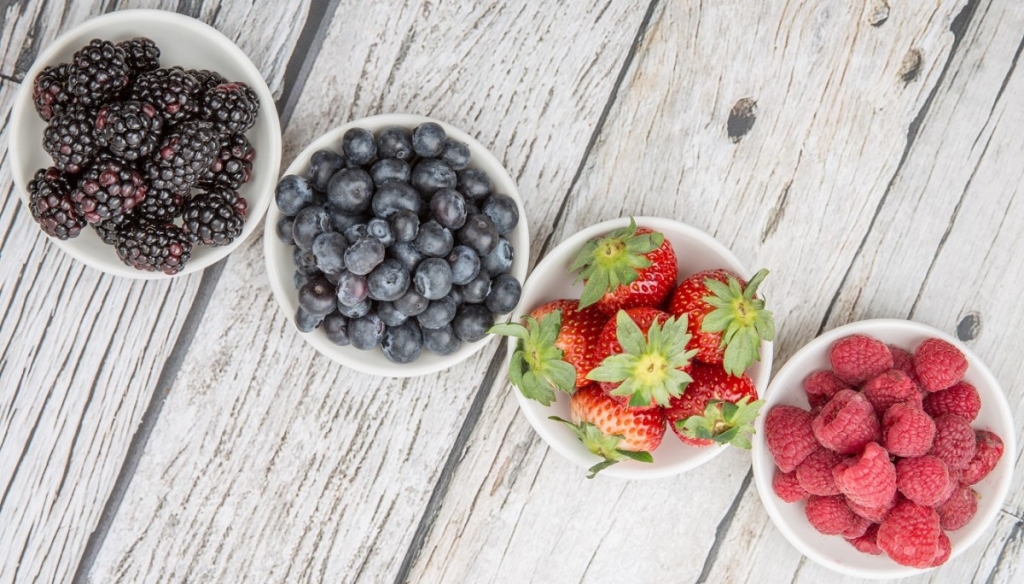
Strawberries
Strawberries make a wonderful addition to any fruit salad and are known to jumpstart countless desserts, drinks and cocktails. They’re high in Vitamin C and fibre and are one of the most potent sources of antioxidants of any fruit or vegetable.
- A strawberry’s anti-inflammatory properties are linked to reduced risks of bowel problems and arthritic conditions.
- High levels of antioxidants and phytochemicals in strawberries help reduce inflammation in the body.
- The fibre in strawberries is known to reduce blood sugar levels, so they’re a great source of natural sweetness for diabetics.
- Strawberries have been linked to increased cognitive function.
- They’re considered a desirable fruit to combat the ill effects of ageing.
- Strawberries are a good source of magnesium, nitrate and folate.
- Potassium found in strawberries helps regulate blood pressure.
Blackberries
The blackberry is the ‘quiet achiever’ of the berry world. Not quite as famous as its red and blue cousins, blackberries are still delicious on their own or added to a variety of dishes, desserts and preserves.
- Blackberries are high in Vitamin C – essential for your immune system.
- Blackberries are high in Vitamin E, known to protect the heart, strengthen blood vessels and improve eyesight.
- A top 10 fruit for antioxidants, which are essential to combat the effects of ageing and protect against a range of diseases including certain cancers.
- Blackberries are high in phytoestrogens, which are associated with protecting against breast and cervical cancer.
- They’re high in fibre.
- Blackberries contain folic acid – which can reduce chromosomal defects in sperm.
Blueberries
As far as flavour and nutritional value go, blueberries are a standout superfood. High in antioxidants, they deliver many health benefits – and they are delicious atop breakfast cereals, in salads or simply on their own.
- Blueberries are very high in antioxidants, which are shown to help neutralise the ‘free radicals’ that cause cancer, heart disease and other age-related illnesses.
- With relatively low GI value, blueberries can help regulate blood sugar levels.
- Antioxidants in blueberries are linked to increased eye and retina health.
- Blueberries contain a compound that assists with urinary tract health and can prevent infection.
- Low in calories and high in potassium.
- High source of Vitamin C, E and fibre.
- Blueberries help boost insulin sensitivity for prevention against the onset of type 2 Diabetes.
- The antioxidant compounds in blueberries protect against inflammation.
- The minerals potassium, copper, iron, zinc and manganese are all found in blueberries, and together they help control blood pressure.
- Blueberries help clear neuro toxins in the brain, which may delay memory loss.
Raspberries
Raspberries are a ‘special occasion’ treat. Highly fragile and perishable, they are delicious on their own or added to desserts and drinks. And of course, raspberry jams, preserves and sauces are all wonderful ways to enjoy tangy flavour.
- Raspberries are full of potassium, folate and magnesium.
- Raspberries are most famous for their high content of ellagic acid – an antioxidant linked with preventing damage to cell membranes and reducing the risk of cancer.
- They are rich in Vitamin C, A, E and a range of B class vitamins including thiamine, riboflavin and niacin.
Storage
Once picked and packed, our berries are sent to controlled cool rooms on the same day. Here, they are inspected for quality control and then refrigerated to optimum storage temperature.
Costa is a pioneer in the use of the modified (or controlled) atmosphere method of storage – the berries are stored just below zero temperature, where they are effectively ‘put to sleep’. Originally developed as a way of storing apples and pears to prolong shelf life, Costa was the first Australian company to employ this method for berry storage.




